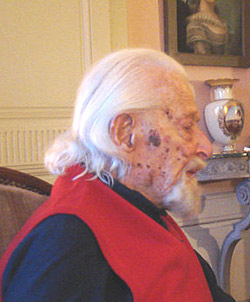Hugues Cuénod facts for kids

Hugues-Adhémar Cuénod (born June 26, 1902 – died December 6, 2010) was a famous Swiss singer and music teacher. He was known for his beautiful voice and for singing in many different kinds of music shows. These included opera, operetta, and musicals. He also performed on concert stages, where he was especially loved for his clear and expressive singing of French songs called mélodies.
Hugues Cuénod was a very skilled singer. He could sing many types of music, from old medieval songs by Guillaume de Machaut to modern works by Igor Stravinsky. He also recorded songs played with a lute, an old string instrument.
Cuénod helped bring back baroque music, which is music from the 1600s and 1700s. He was also famous for singing the music of Johann Sebastian Bach, especially the part of the Evangelist in Bach's St Matthew Passion. He had the longest career of any recorded singer in history. He started performing in Paris in 1928. Later, he became very well known for playing Emperor Altoum in Giacomo Puccini's opera Turandot, even singing with the famous Plácido Domingo.
His Musical Journey
Hugues Cuénod was born in Corseaux-sur-Vevey, Switzerland. His family had some English roots. When he was 11, he went to the 78th birthday party of the famous composer Camille Saint-Saëns. Saint-Saëns even played piano with another famous musician, Ignacy Jan Paderewski, at the party. Cuénod studied music in Switzerland and Vienna, learning both French and German styles.
He began his career singing in concerts. In 1928, he performed on stage for the first time in Paris. The next year, he sang in the United States. From 1930 to 1933, he worked in Geneva, and then in Paris from 1934 to 1937. He also went on a long concert tour in North America. From 1940 to 1946, he taught music at the Geneva Conservatory.
In 1943, he started singing in operas again. He performed in famous opera houses like La Scala in Milan and the Royal Opera House in London. Cuénod was known for several roles, including Basilio in Mozart's The Marriage of Figaro. He also played Sellem in The Rake's Progress, a role that was written just for him by Igor Stravinsky. Before World War II, he often went to fancy gatherings and worked with Nadia Boulanger. They made important recordings of old songs called madrigals. After the war, his natural singing style helped make old music popular again.
In 1969, Cuénod performed Renaissance music with American lutenist (lute player) Ray Lynch. In the 1970s, he gave many concerts in the United States and France. He also recorded an album of lute songs by the English composer John Dowland.
Cuénod holds a special record: he was the oldest person to make a debut at the Metropolitan Opera in New York City. He was 84 years old when he first sang there on March 12, 1987, as Emperor Altoum in Turandot. He performed this role 14 times. His very last stage appearance was in 1994, when he was 90. After he stopped performing, he became a music teacher in England.
Awards and Recognition
In the 1970s, Cuénod's recording of Erik Satie's Socrate won a big award called the Grand Prix du Disque Mondiale. In 1976, he received the Chevalier des Arts et des Lettres, which is an honor from France for people who have done great things in arts and literature. When he turned 100 in 2002, he was given the World of Song award.
His Life Story
Hugues Cuénod's first language was French, but he also spoke English, German, and Italian very well. He lived with his partner, Alfred Augustin, in the Vaud region of Switzerland. They lived in the Château de Lully, an old castle that belonged to his grandfather.
In June 2007, when Cuénod was 105 years old, he and Alfred Augustin entered into a civil union. This was after Swiss law changed to give same-sex couples many of the same legal benefits as marriage.
Hugues Cuénod lived to be over 100 years old. He passed away at the age of 108 on December 6, 2010, at his home in Vevey, Switzerland.
See also
 In Spanish: Hugues Cuénod para niños
In Spanish: Hugues Cuénod para niños

